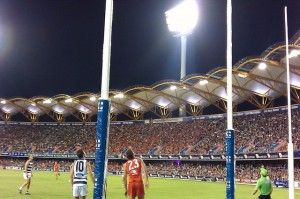The AFL knew what it was doing when it scheduled only matches involving its two newest additions on Easter Sunday. It was an admission that people don’t like to go to the footy on the day. Keeping that in mind, the fixture was fair enough.
What is not fair enough was the performances of those fledgling clubs. Both were seriously uncompetitive. But first, a bit of history…
The last two AFL clubs to genuinely be built from scratch (before the Gold Coast Suns and the Greater Western Sydney Giants) were the Brisbane Bears and the Fremantle Dockers.
Both were built to compete for wins right from their first game. Brisbane was built entirely on mature, senior players (albeit mostly rejected by other VFL clubs), and Fremantle was built on a significant collection of mature, senior players and a strong emphasis on indigenous talent.
Both teams won early in their existence; nearly everyone forgets that Brisbane started their first season at the MCG against finalists from that year North Melbourne, then went to Kardinia Park to play Geelong. They won them both.
Fremantle found themselves in the race for the finals quite some time into their first season.
Sounds good, huh? Both teams took eight years to play finals. To offer some perspective, excluding the expansion teams, only Richmond hasn’t played finals in the last eight seasons.
So it is clear to see why the Gold Coast and GWS want to avoid the Brisbane Bears/Fremantle model, because it didn’t work. Brisbane rebuilt, were more uncompetitive in their fifth season than in their first, but that fifth season was the beginning of a slow build that culminated in a 1996 Preliminary Final berth.
Fremantle also had to rebuild their list in order to make finals in 2003.
What we are seeing now is the testing of a road that has never been travelled: collect a bunch of kids (and the odd mature, senior player) and throw them to the wolves for 1-3 seasons.
I suggested in January that GWS would be the least competitive side in the VFL/AFL since St Kilda were losing every match in their first three seasons in the 1890s.
They have only one player on their list in their prime physical performing years: an Irish hurling player who never cemented a spot in a Carlton side that was ordinary for much of his time there. Other than that, they are either very young or very old.
On Sunday they were beaten by 21 goals by North Melbourne, world beaters by no one’s estimation. This was with an injection of experience into the side – Tom Scully & Luke Power didn’t play Round 1 against Sydney – but lined up against the Kangaroos.
North of the Tweed, the Gold Coast Suns were expected to be progressing. They won three games last year, and the second year blues were not expected to bite all of their young players.
Yet, they’ve just lost two games to average sides (no one has Adelaide or St Kilda finishing higher than fifth) by 69 and 92 points respectively.
I’ve generally been complimentary in my comments about the Suns. They did everything right to get Gary Ablett, built their side from the back with senior players like Nathan Bock, Jarrad Harbrow and Campbell Brown, and won games last year.
But they’ve always had problems kicking goals. They don’t seem to have a natural key forward coming up, and on Sunday they rotated Tom Lynch and Steven May through full-forward without any real intent. Neither had much of an influence.
The criticism that came Gold Coast’s way yesterday in the pre-match radio shows was pointed. Except for the wonderful Ablett (who Jason Dunstall described as the “best on-field leader ever” in the TV coverage on Sunday *HYPERBOLE ALERT*), they don’t seem to have anyone who is even beating their opponent at the moment.
This week they have Essendon, who are in the same group of teams as Adelaide and St Kilda that will fill the middle portion of the ladder. They need to show an improved performance. They have six winnable games left.
The affect that constant losing and going through the motions in the second halves of matches remains to be seen. But footballers need to compete, and it’s hard to compete honestly when a win is simply not possible.
On the other hand, clubs like Geelong, Hawthorn and Collingwood seem to be able to find an endless line of youngsters who can come in a play a meaningful role in winning football straight away.
This would suggest that the best thing for developing youth, other than surrounding them with strong, mature leadership, is to have them playing in winning teams.
While Ablett, Bock, Brown, Harbrow and Josh Fraser came from successful, winning clubs, there is only so much that can be done on the training track or the locker room.
Eventually losing becomes a habit that is just too hard to break. While it is still early for the Suns and the Giants, chances are we’ll only know they’ve gone past the point of no return after the fact.
All the evidence we have so far suggests that the Gold Coast went a little too far towards youth in terms of list balance. The fact that GWS have gone even further does not augur well for them. Perhaps youth will prevail.
The AFL certainly hopes so.




